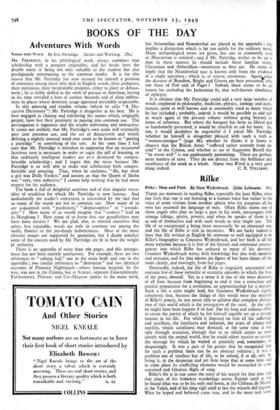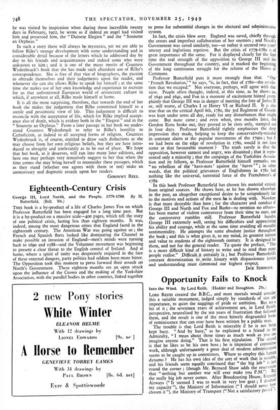Rilke
Rilke : Man and Poet. By Nora Wydenbruck. (John Lehmann. 18s.)
THERE are moments in reading Rilke, especially the later Rilke, when one feels that one is not listening to a human voice but rather to the voice of some visitant from another sphere who for purposes all his own has assumed the language of men. Often Rilke seems one of those angels who play so large a part in his work, messengers with strange tidings, spirits, powers, and when he speaks of them it is as one of themselves and with such words as they might use. The life of so exceptional a being must necessarily be an abnormal one, and the life of Rilke is rich in mysteries. We are lucky indeed to have that life written in English by someone so well equipped to be Rilke's biographer as Countess Wydenbruck, and her book is all the more welcome because it is free of the literary and emotional extrava- gances into which Rilke has seduced so many of his devotees. Countess Wydenbruck writes with knowledge but also with modesty and restraint, and for that rektsbn the figure of her hero shines all the more clearly, and movingly, from her pages.
Outwardly, indeed, he life of Rilke is singularly uneventful and contains few of those romantic or eccentric episodes in which the lives of the poets abound. Yet in a sense it is one of the most dramatic, of all lives because from beginning to end it was a conscious and painful preparation for a revelation, an apprenticeship for a miracle. Such a life a saint might lead, but Countess Wydenbruck rightly comments that, because the things of this world were the material of Rilke's poetry, he was never able to achieve that complete abnega- tion of this world which is the prerogative of the saint. As she says, he might have been happier if he had. For his long and arduous effort to create the poetry of which he felt himself capable set up a strange tension in his life. For while it imposed on him all the sufferings and sacrifices, the loneliness and isolation, the years of silence and sterility, which saintliness may demand, at the same time it was only through sensation, through that in us which unites us most closely with the animal world, that he could either receive or convey the message for which he waited so patiently and, sometimes, so despairingly. It was a part of his genius that he recognised that for such a problem there can be no abstract solution it was a problem not of intellect but of life to be solved, if at ail, only by living it, in the desperate and yet Arm hope that at some time and in some place its conflicting elements would be reconciled in some sustained and fabulous flight of song.
Rilke's life is in one sense the story of his search for that time and that place, of his homeless wanderings across Europe until at last he found what was to be his only real home, at the Chateau de Muzot, in the Valais, and of his long vigil until at last the miracle did happen. Whathe hoped and believed came true, and in the most real sow he was visited by inspiration when during those incredible twenty days in February, 1922, he wrote as if indeed an angel had visited him and possessed him, the " Duinese Elegien " and the " Sonnette an Orpheus" In such a story there will always be mysteries, yet we are able to follow Rilke's strange development with some understanding and in considerable detail because of the letters which he addressed day by day to his friends and acquaintances and indeed some who were unknown to him ; and it is one of the many merits of Countess Wydcnbruck's book that she has made such abundant use of Rilke's correspondence. She is free of that vice of biographers, the passion to obtrude themselves and their judgements upon the reader, and whenever she can she allows Rilke to speak for himself ; at the same time she makes use of her own knowledge and experience to recreate for us that unfrontiered European world of aristocratic culture in which, if anywhere at all, Rilke made himself at home.
It is all the more surprising, therefore, that towards the end of her book she makes the judgement that Rilke committed himself to a sterile and pessimistic view of life. This judgement is difficult to reconcile with the acceptance of life, which for Rilke implied accept- ance also of death, which is evident both in the " Elegien " and in the " Sonnette an Orpheus." From a later passage in her book we under- stand Countess Wydenbruck to refer to Rilke's hostility to Catholicism, as indeed to all accepted forms of religion. Countess Wydenbruck is, of course, entitled to draw such deductions as she may choose from her own religious beliefs, but they arc here intro- duced so abruptly and irrelevantly as to be out of place. We hope that her book, as it deserves, will run into many later editions, and here one may perhaps very tentatively suggest to her that when the time comes she may bring herself to reconsider these passages, which as they stand (whether one agrees with them or not) make an unnecessary and dogmatic assault upon her readers.
GORONWT REES.







































 Previous page
Previous page